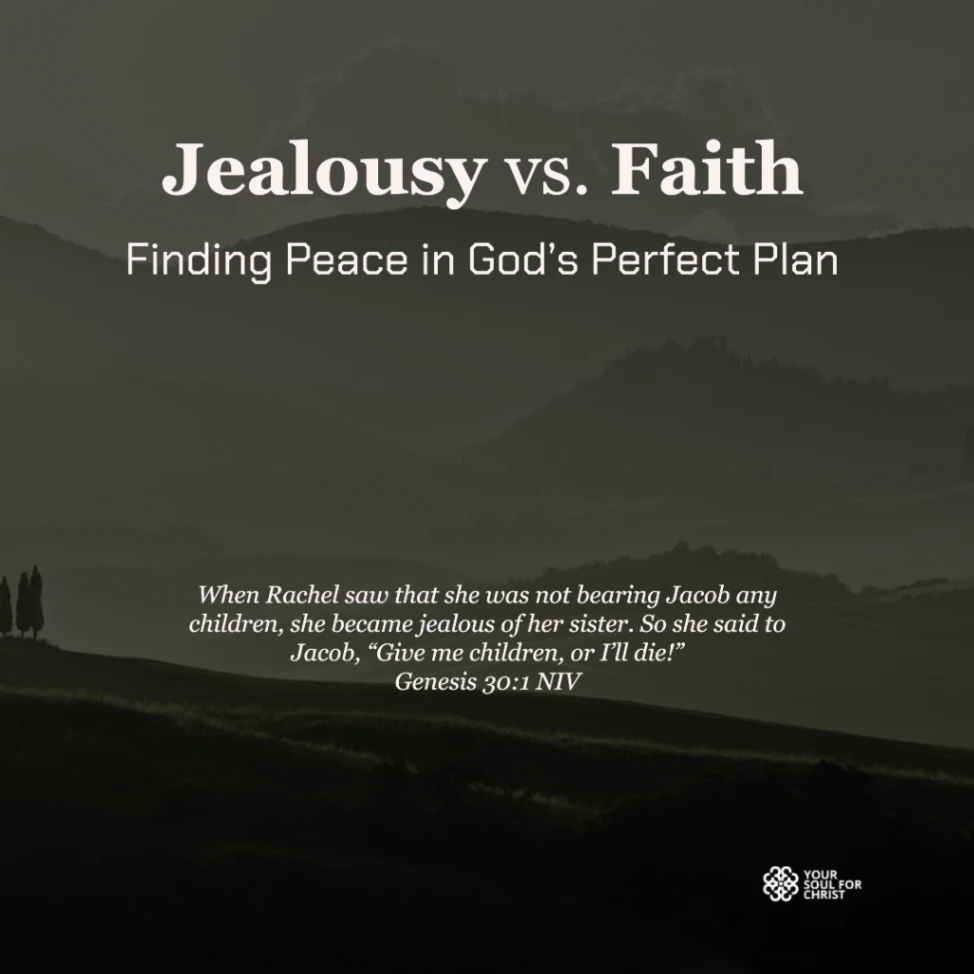When Rachel saw that she was not bearing Jacob any children, she became jealous of her sister. So she said to Jacob, “Give me children, or I’ll die!”
Genesis 30:1 NIV
When unmet desires claw at our hearts, jealousy can erupt—as it did for Rachel in Genesis 30:1. Faced with barrenness, she demanded of Jacob, “Give me children, or I’ll die!” Her words, raw with desperation, reveal a struggle many know well: the ache of unmet longing and the temptation to fixate on what others have. Yet Rachel’s story offers more than a cautionary tale—it lights a path toward faith-filled surrender.
Rachel’s jealousy of Leah’s fertility consumed her. While Leah bore sons, Rachel’s arms remained empty, and her heart grew bitter. Jealousy, as Paul warns, is a “fruit of the flesh” (Galatians 5:19-21), not the Spirit. It blinds us to God’s goodness and amplifies our lack. Rachel’s cry—“Give me children!”—was not just a plea for a child but a revelation of misplaced trust. She saw Leah’s blessing as a threat, not a testament to God’s power.
In this, Rachel mirrors our own struggles. How often do we measure our worth by what others possess—gifts, opportunities, or milestones—while overlooking God’s unique purpose for our lives?
Rachel’s demand to Jacob exposed a deeper issue: she sought from her husband what only God could provide. Jacob, rightly exasperated, retorted, “Am I in the place of God?” (Genesis 30:2). Yet how easily we, too, burden others—spouses, friends, leaders—with expectations meant for the Divine. Careers, healing, or fulfilment cannot be wrung from human effort alone.
Leah’s children were not a fluke but a testament to God’s faithfulness, who “opens the womb” (Genesis 29:31). Rachel’s error was prioritising competition over communion—with God and her sister.
Rachel’s story underscores a vital truth: how we respond to trials reveals where we’ve anchored our hope. Had she cultivated intimacy with God before her crisis, her reflex might have been prayer, not panic. David, no stranger to despair, wrote, “Delight yourself in the Lord, and He will give you the desires of your heart” (Psalm 37:4). This isn’t a transactional promise but an invitation to align our desires with His will.
Consider Hannah (1 Samuel 1:10-20). Like Rachel, she wept over barrenness—but she “poured out her soul to the Lord” (v. 15). Her raw honesty birthed not only Samuel but a legacy of faith.
Three Steps to Replace Jealousy with Trust
- Acknowledge God’s Sovereignty
Rachel’s jealousy festered because she viewed Leah’s blessing as a personal slight. Instead, we’re called to “rejoice with those who rejoice” (Romans 12:15), trusting God’s plan is expansive enough for all. - Bring Your Desires to God—First
Start each day in prayer, not comparison. As Jesus taught, “Seek first His kingdom” (Matthew 6:33). Journal your longings, then surrender them. - Celebrate Others’ Blessings
Leah’s children were not obstacles but proof of God’s faithfulness. When envy stirs, shift your gaze: What might God be teaching me through this person’s joy?
Rachel’s story doesn’t end in despair. God later opened her womb, gifting her Joseph—a redeemer for his family. Yet even in her waiting, God saw her. The name “Ben-Oni” (son of my sorrow), which Rachel gave her final child, was reframed by Jacob as “Benjamin” (son of my right hand)—a reminder that God transforms our pain into purpose.
Are you demanding answers from people instead of seeking God? How might your current struggle become a catalyst for deeper trust?
Jealousy shrinks our vision; faith expands it. Let Rachel’s journey remind us: the God who formed the stars knows your name, your tears, and the perfect timing of your breakthrough. Anchor in Him—not in what others have—and watch His faithfulness unfold.

